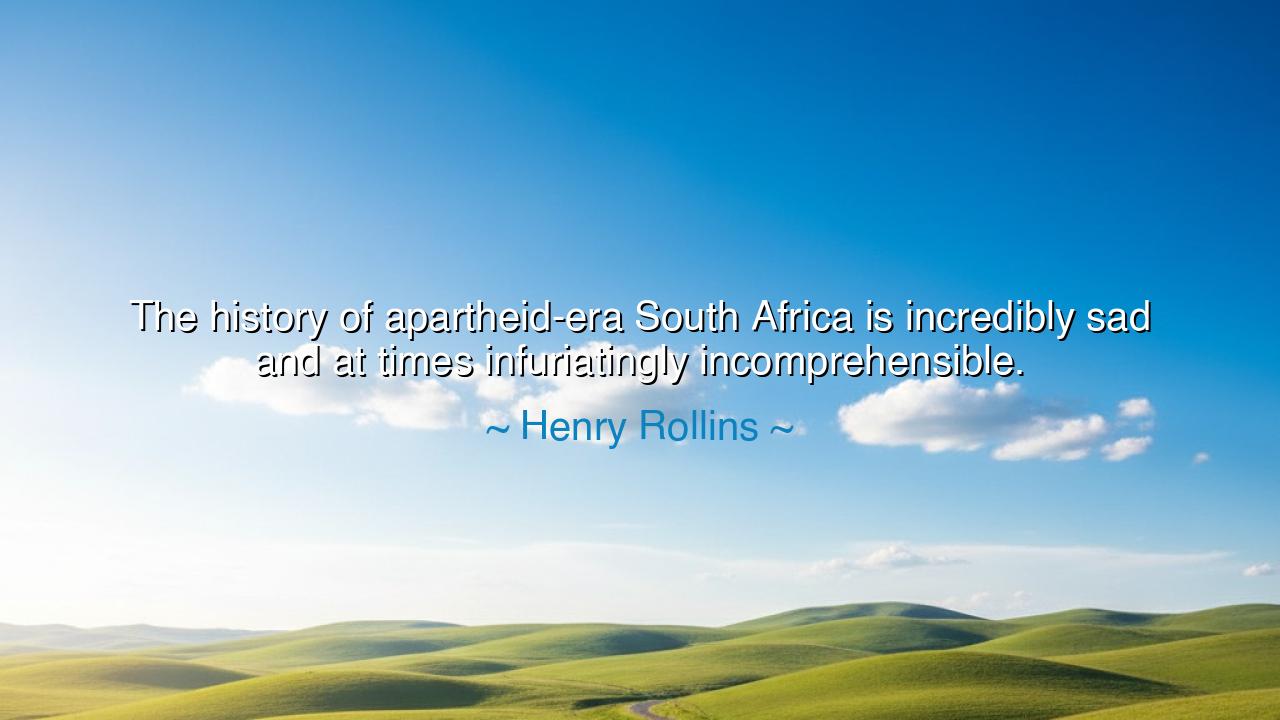
The history of apartheid-era South Africa is incredibly sad and
The history of apartheid-era South Africa is incredibly sad and at times infuriatingly incomprehensible.






Hear the words of Henry Rollins, who spoke with a voice heavy with grief and outrage: “The history of apartheid-era South Africa is incredibly sad and at times infuriatingly incomprehensible.” In this statement lies both mourning and bewilderment, for it is a cry not only about a nation, but about the human condition itself. How is it that men, born of the same earth, drinking the same waters, breathing the same breath, could raise such walls of hatred, cruelty, and division? Truly, it is a history sad, and yet so monstrous that it defies understanding.
The apartheid era was not merely politics—it was a system of chains, forged not of iron but of laws and lies. It declared that one man’s skin made him master, while another’s skin made him less than human. Families were torn apart, homes uprooted, voices silenced, lives crushed under the weight of a false order. To read of it is to feel both sorrow and rage: sorrow for those who suffered, and rage that such a deception could endure for so long, defended by those who claimed civilization while practicing barbarity.
Yet within this dark age rose figures of luminous courage. Remember Nelson Mandela, who, though confined for twenty-seven years in prison, did not allow his heart to be broken. His chains became his crucible, and when released, he chose not vengeance but reconciliation. In him we see the paradox of history: that the greatest cruelty can awaken the greatest strength, and the most incomprehensible injustice can give rise to a hero whose vision reshapes the world. Without the cruelty of apartheid, perhaps we would never have known the magnitude of his forgiveness.
But let us not be deceived into thinking this tale belongs only to South Africa. Every land carries within it the temptation to divide, to dominate, to dehumanize. The tragedy of apartheid is the mirror of humanity’s own weakness: that fear breeds hatred, and hatred, once enshrined in law, breeds generations of sorrow. From the American South to the ghettos of Europe, the same pattern appears. Thus, Rollins’ words remind us not only of one nation’s sad history, but of the vigilance required of all nations, in all times.
The incomprehensible lies not only in the cruelty, but in the blindness of those who enforced it. How could they not see that the wealth of the land flowed from the labor of the oppressed? How could they not see that by crushing their neighbors, they diminished themselves? Such blindness has existed in many ages: the Romans who enslaved conquered peoples, thinking them inferior, or the rulers of medieval kingdoms who starved their peasants while feasting in halls of gold. Always the same folly: the belief that division strengthens, when in truth it rots a nation from within.
The lesson, therefore, is both painful and necessary: do not ignore injustice simply because it seems distant or normal. What is tolerated grows strong; what is left unchallenged becomes law. The sad history of apartheid teaches us that silence is not innocence, but complicity. Each person must choose—whether to be the voice that sustains oppression, or the voice that challenges it. Even a small act of truth is a blow against lies; even a small act of courage is a spark that weakens the darkness.
So let all who hear take this counsel: study the histories of sorrow, not to be crushed by them, but to be awakened. When you see injustice in your time, whether in your community or in the greater world, do not say, “This is incomprehensible” and turn away. Say instead, “This is intolerable,” and stand against it, however you can. Remember Mandela, who endured decades in chains but walked free with dignity. Remember the nameless millions, whose tears watered the tree of freedom. Their suffering demands that we remain vigilant, that their sad story not be repeated in another land, under another name.
Thus, the teaching endures: though the history of apartheid-era South Africa is indeed sad and incomprehensible, it is also a warning and a torch. A warning that human cruelty can always return if unchallenged, and a torch to guide us toward justice, compassion, and unity. To honor the dead and the oppressed, we must live as guardians of equality, lest the sorrow of yesterday become the sorrow of tomorrow.






AAdministratorAdministrator
Welcome, honored guests. Please leave a comment, we will respond soon